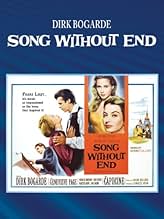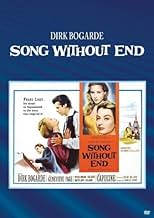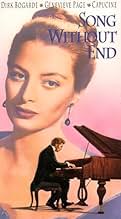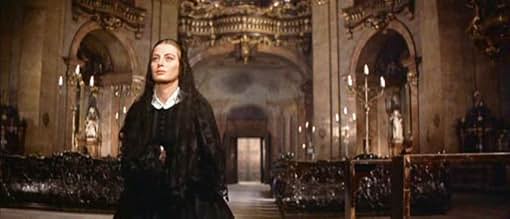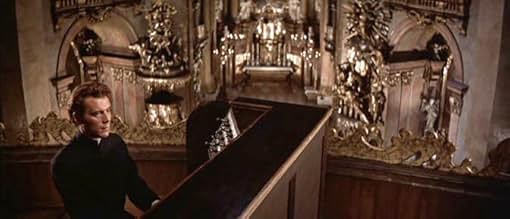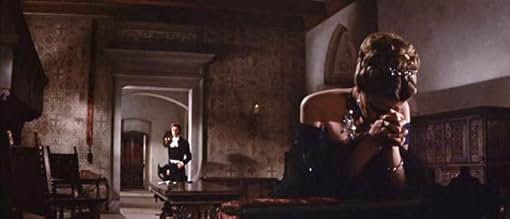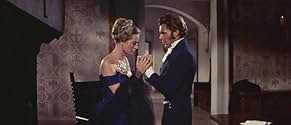अपनी भाषा में प्लॉट जोड़ेंThe romantic story of Hungarian pianist Franz Liszt (Sir Dirk Bogarde), whose scandalous love affair forced him to abandon his adoring audiences.The romantic story of Hungarian pianist Franz Liszt (Sir Dirk Bogarde), whose scandalous love affair forced him to abandon his adoring audiences.The romantic story of Hungarian pianist Franz Liszt (Sir Dirk Bogarde), whose scandalous love affair forced him to abandon his adoring audiences.
- निर्देशक
- लेखक
- स्टार
- 1 ऑस्कर जीते
- 2 जीत और कुल 3 नामांकन
- Thalberg
- (as E. Erlandsen)
- Chopin
- (as Alex Davion)
- Emissary
- (काटे गए सीन)
- Audience Member
- (बिना क्रेडिट के)
- Komparsenrolle
- (बिना क्रेडिट के)
फ़ीचर्ड समीक्षाएं
'Song Without End' is certainly much better than Ken Russell's 'Lisztomania', a very hard to rate film that was visually striking but ruined by gratuitous excess and lack of taste, and does have many pleasures but biographically it disappoints.
It is a visually sumptuous film for starters, it's very beautifully photographed, the costumes are lavish, richly colourful and true to period and the settings, interiors and scenery are gorgeous to watch. The music is definitely the highlight of 'Song Without End', whether it is bombastic and energetic like the second 'Hungarian Rhapsody' or intimate and poignant like the third 'Liebestraume', and it's all cleverly arranged. Contrary to one reviewer the inclusion of music of other composers was quite nice though there could have been a little more of Liszt's, 'Totentanz' would have been absolutely thrilling to listen to.
One mustn't forget the magnificent playing of Jorge Bolet, absolutely agree that it is some of the best-performed classical music in film. Liszt's music is fiendishly and notoriously difficult for a pianist ('Totentanz' for example is hard enough with piano and orchestra, in solo piano version it's a killer), but Bolet , with such energetic, hugely musical and poetic playing, makes it sound effortless. 'Song Without End' is nicely directed, and never resorts to vulgarity or excess. While its representation of Liszt is not exactly a faithful one (one doesn't find it easy to believe him as that much of a womaniser, almost too much on the slightly sleazy side, and especially as a prima donna), it is not the literal character assassination of 'Lisztomania', because it also gets some things right like he was a man of great charity, was highly noble and women were attracted to him). 'Song Without End' is also not without its powerful and affecting moments, and the music plays an enormous part in why that is, the fact that Liszt played the music of other composers as well and that he was a fan of Chopin is incorporated remarkably intelligently.
The cast are very good. Whether one takes issue with how Liszt is portrayed, it cannot be blamed at Dirk Bogarde's door but how he's written. Bogarde does an excellent job, and is very believable and charismatic whether amorous or more intense in the context of how Liszt is written and as a performance in general. Genevieve Page and especially Capucine are breathtakingly beautiful, and Page also plays the film's most sympathetic character very poignantly. Martita Hunt is also memorable, Hunt as is evidenced by her definitive Miss Havisham in David Lean's classic 'Great Expectations' had a knack for stealing scenes regardless of the size of the role. Bogarde and Capucine and particularly Bogarde and Page also convince together, quite touching in fact at times.
For all its many good things, 'Song Without End' is not without its flaws. There is an exception to the high standard set by the cast, and that is agreed the miscast and out of place Lou Jacobi, whose appearance and the way he spoke being somewhat anachronistic and jarring. The film does drag in places, getting bogged down by a few strands like the greatly and too obviously romanticized romances (that are also factually distorted, the film fails to mention the Countess' emotional problems before meeting Liszt and how big a part it played in their break up).
The story here is compelling but some things that were included could have been elaborated on in more detail. While there are some things that are faithful- like his devotion for art- it is every bit as easy to spot the inaccuracies and anachronisms, like the notion of Liszt feeling inferior to Chopin with the existence of his 'Transcendental Etudes' being long before he even met Chopin . It does focus too much on the romantic side of his character and not enough on his magnetic way of performing he held that earned him the admiration of several other fellow performers (it does focus on a small portion of his life and unfortunately it is not the most compelling or the most telling of Liszt's character). Lastly, some of the script is flimsy with some soap-opera-like dialogue and areas that were potentially interesting but lack depth.
All in all, disappointing in some areas but also a film of many pleasures. 6/10 Bethany Cox
I was expecting a comprehensive presentation of Liszt in a film devoted to his life and creative work. Less of interest were works by Bach, Beethoven, Mozart and others. The results looks like the film makers may have lacked complete confidence that a movie featuring compositions exclusively by Liszt would be that attractive to viewers.
In the event that's the case, it's no wonder the critical and public rating of this film is less than excellent. What's notable about it is the exquisite piano performance of Jorge Bolet on the soundtrack, the rich cinematography of James Wong Howe, and the flavorful performances by a talented cast headed by Dirk Bogarde.
I will always remember that performance of ' Les Prelues'as being the most powerful that I have ever heard even from the best symphony orchestras.The performances of the late Jorge Bolet are magnificent.Especially during the clever arrangement of the Concerto/Hungarian Fantasia. It is clear that Dirk Bogarde is not playing the piano,yet one cannot help but take pleasure in the greatness of the music whomever is playing.
The producer of the film also takes great pains in letting the audience know that Franz Liszt often performed the music of other composers like Wagner and Berlioz.He also was a great fan of Chopin. This is addressed in the film with care and intelligence.
I remember this film as a child and can still remember the great music.Thank God! for the score from Song Without End.
I thrilled to the bombast and impossible fingerwork of Hungarian Rhapsody No. 2. But the final piece Liszt (portrayed by Bogarde) played as he retreated to the monastery haunted me throughout my teenage years. Liebestraume No. 3 ("Dreams of Love") can either be a soothing balm or a cutting knife for the lovesick.
Bogarde, who obviously knew his onions about piano playing displayed the exact fingerwork on the proper fields of the keyboard and his body English was totally convincing. Well after all, he was not only an actor but a true artist - an accomplished writer and a painter.
Capuccine, touted as one of the most beautiful women at the time, portrayed the Princess of Witgenstein. But my heart fell for the jilted wife, the Belgian countess portrayed by Genevieve Page whom I found more,"simpatica."
क्या आपको पता है
- ट्रिवियाCharles Vidor had completed about 15 percent of this movie when he died of a heart attack on June 4, 1959. Sir Dirk Bogarde later recalled that he was "secretly relieved" by Vidor's death, since he and his co-star, Capucine had been treated badly by the short-tempered director. Vidor would often scream at Capucine to relax, and at one point, Bogarde recalled, "shook her like a dead cat." Vidor was replaced by George Cukor, who got along much better with his stars, and was more of an "actor's director."
- गूफ़Grand Duchess make reference to "Ukraine" in one scene. The term was not in wide use in the 1840s, especially not among Russian nobility.
- भाव
Countess Marie: I met Franz at a musical party. I remember he played a ballade in A-flat major by Chopin. I thought I'd never seen anything as beautiful as Franz looked when he sat at the piano. I... I wanted to cry. He watched me as he played; Franz never fails to notice a pretty woman in his audience. Afterward, he followed me into the hall. I remember he said, "May I escort you somewhere, madame?" And I said, "Yes." And he said, "Where?" And I said, "Paradise." He didn't smile - he said, "I'll call a carriage."
Princess Carolyne: Did he?
Countess Marie: What?
Princess Carolyne: Drive you there - to paradise?
Countess Marie: [a pause, and a meaningful look as she turns to leave the room] He doesn't know the road, madame.
- कनेक्शनFeatured in Film Profile: Dirk Bogarde (1961)
टॉप पसंद
- How long is Song Without End?Alexa द्वारा संचालित
विवरण
- रिलीज़ की तारीख़
- कंट्री ऑफ़ ओरिजिन
- भाषा
- इस रूप में भी जाना जाता है
- Song Without End - The Story of Franz Liszt
- फ़िल्माने की जगहें
- उत्पादन कंपनी
- IMDbPro पर और कंपनी क्रेडिट देखें
- चलने की अवधि2 घंटे 21 मिनट
- पक्ष अनुपात
- 2.35 : 1


